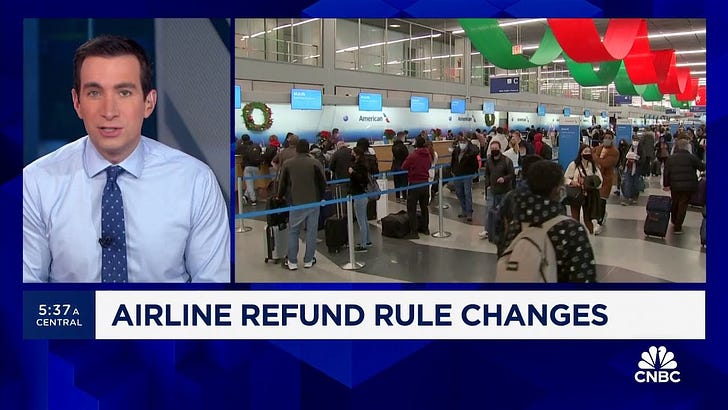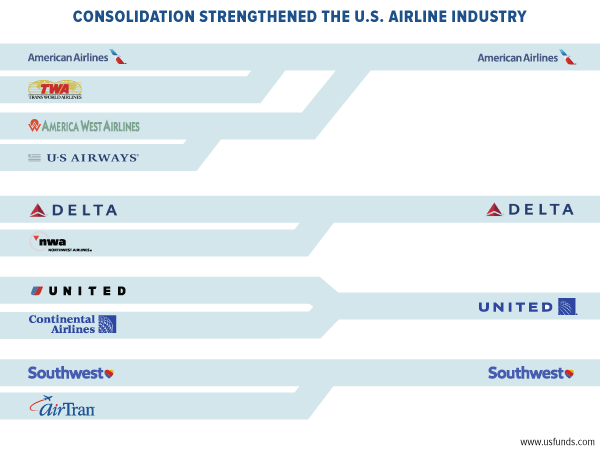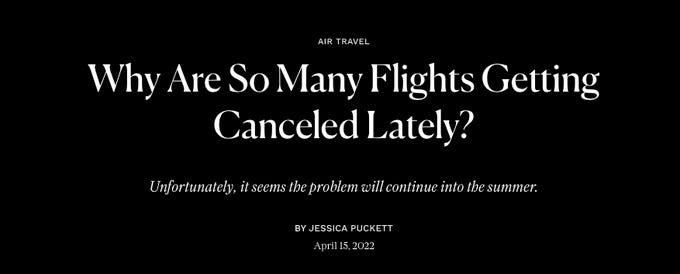How Airline Lobbyists Just Got Humiliated
After years of bad service and cancelations, finally airlines got pushed back. Secretary Pete Buttigieg and President Joe Biden imposed new rules on the industry. And got Congress to go along.
Welcome to BIG, a newsletter on the politics of monopoly power. If you’d like to sign up to receive issues over email, you can do so here.
Today’s piece is about how airline lobbyists were soundly thrashed in a fight over whether and how to offer refunds for flights that are canceled. While you would think something so simple would have been fixed long ago, it turns out that airlines have been stiffing people, on the order of potentially tens of billions, for years. Finally, this week, they lost, and Congress, yes, the dysfunctional body everyone hates, passed a law mandating that airlines give automatic refunds when your flight is canceled and you aren’t rebooked.
But it’s how the airlines lost that matters, because their loss implies that it is in fact possible to govern. The dispute represents, in miniature, the broader rethink of regulating corporations in America going on right now. You won’t hear this kind of good news most places, because we’re so inured to imagining politics can’t work. But it can. And it just did.
So let’s dive in.
The Granddaddy of Junk Fees
The two new phrases that emerged in politics last year were “junk fee” and “enshittification.” Junk fee means an unfair or hidden charge tacked onto what you thought was the price, while enshittification is the experience of seeing pervasive financial incentives destroy a communications platform. That these are actual new words requiring additions to our language shows that these concepts are commonplace.
One of the main theories of BIG is our increasing disillusionment comes from pervasive nickel and diming we experience at the hands of the corporations that run most of our key infrastructure. Whether it’s an automated phone tree to deal with some customer service problem, a junk fee attached to a hotel stay, or not knowing whether and how much you’ll be billed for a hospital visit, life is increasingly scary and full of weird negative surprises in commerce. Junk fees and enshittification are additions to our language for a reason.
Leading the way on that front has been the airline industry, which has found innovative ways of charging fees and annoying customers since pricing was deregulated in the 1980s. It’s so bad that there’s a consulting firm in the industry called IdeaWorks - whose slogan is ‘Building Revenue Through Innovation’ - that sends out regular press releases cheering the amount of airline junk fees they help invent.
There are a couple of reasons airlines were leaders in irritating customers. First, there really is a lot airlines can’t control. They are careful about safety, they manage weather risk, and there are accidents. But also, deregulation was an extremely bad policy choice, and led to a situation where airline CEOs can treat customers poorly, and it doesn’t affect their competitive position or profits.
Prior to 1978, airlines were a regulated public utility where prices and routes were set by the government, with a guaranteed small profit based on the costs they incurred running their system. This pricing model meant that airlines had no incentive to screw customers or workers, because they wanted to spend more on things like safety, since that meant more profit. If anything, the regulated model meant too much gold-plating of service, though ticket prices came down systematically since the 1930s, largely because technology got better.
Deregulation flipped this incentive model, allowing airlines to set their own prices and routes. It also prohibited consumers from suing airlines, meaning that airlines are the only corporations that consumers cannot take to court. Instead, consumers have to rely on enforcement of consumer protections from Department of Transportation. So after deregulation, airlines had an incentive to pull every cost they could out of their network, and find ways of raising prices that consumers wouldn’t notice.
Still, the theory was that competition could take care of this dynamic, and new entrants would get into the market to take on the slothful incumbents. At first, entry did happen, but because the air grid is a high capital cost network, there were mass bankruptcies, followed by consolidation.
President Bush approved the merger of U.S. Airways and America West, as well as Delta-Northwest, and President Obama allowed the combinations of United-Continental, Southwest-AirTran, and American-U.S. Airways. Today, four airlines run our system, with some smaller low cost carriers gingerly trying to challenge them. Americans got used to being brutalized by airlines, with weird fees, mass cancellations, and high profits.
Covid, however, shook us out of our demoralized slumber. From 2020 to 2022, it was an exceptionally obnoxious time in the industry. During the height of Covid, Trump’s Secretary of Transportation, Elaine Chao, along with her deputy and former airline lawyer Stephen Bradbury, paved the way for a miserable flying experience by making it harder for the DOT to propose consumer protection rules. At the same time, Congress bailed out the airlines with a $54 billion aid package in the CARES Act because there were simply no passengers. This money was necessary, but also showed that these are public utilities that should have some sort of obligation to the public.
Airline executives, however, saw the situation differently. They proceeded to screw customers over Covid-era refunds, with thousands of people complaining to DOT that they weren’t given their legally required refunds. A few years later, airlines over-scheduled their flights, which caused a summer of hell in terms of delays and canceled flights. Finally, during Christmas of 2022, Southwest canceled thousands of flights due to a poorly structured IT system. Basically, in the post-Covid era, there were a lot of headlines like this:
The response from government has been, surprisingly, quite good. After decades of consolidation, finally the Antitrust Division stepped in, breaking up the American Airlines-JetBlue joint venture in the northeast, and preventing the JetBlue-Spirit merger. These had impacts; since that merger was prevented, Spirit has dropped its fares by 16%, putting pressure on the industry to cut prices. In December of 2023, Secretary of Transportation Pete Buttigieg fined Southwest $140 million, which was magnitudes larger than any penalty ever levied by the DOT. The result is that the airline scheduling got a lot better, and prices dropped to below where they were prior to 2019.
Whither Refunds?
And yet, the Covid-era bailout and refund fiasco still colors the political environment around the industry, a situation airlines have never made right. So last month, Buttigieg announced a new rule to fix the refund problem. Airlines are required to refund passenger money if they cancel a flight and don’t rebook you. But the thing is, they often just… don’t.
There are many reasons. Passengers don’t know how to request a refund, airlines will offer vouchers instead of cash, the payments get delayed until a passenger jumps through a bunch of hoops, and again, sometimes the airline just doesn’t issue refunds because they’d prefer to keep the money. Since you can’t sue an airline, there’s little anyone can do except complaint to the Department of Transportation.
How much money are we talking about here? The answer, as it turns out, is that we don’t know. In 2010, Ralph Nader tried to find out, and airlines refused to tell him. This year, the Lever examined investment documents, and found that just two airlines - Southwest Airlines and Delta - “suggested in financial statements that they were holding up to an estimated $2 billion and $6 billion each in unused flight credits, respectively.” Bob Sullivan at NBC argued that unused tickets are actually a big profit center for airlines.
The gap between refundable and non-refundable tickets is absurd. An airline industry official tried to argue the point with me during a recent chat and priced a one-way, nonstop ticket between New York and Chicago. Non-refundable cost: $112. Refundable cost: $870. Clearly, free market forces are not at play and are not effectively offering a variety of choices and conditions.
Of course, we’re not talking about making non-refundable tickets versus refundable, but refunds when the airline cancels a flight or otherwise doesn’t deliver a service to the customer, after the customer paid for that service. Last month, Buttigieg finalized a rule proposed in 2022 that would fix this problem by mandating automatic refunds if a flight is canceled and you aren’t rebooked. It was a simple and elegant solution, since it takes the onus off the passenger and puts it onto the airline, which can implement automated systems. It’s also something that Allegiant Air already does, so it’s an industry practice, just not a widespread one.
The White House bragged about their policy choice, since it’s something that people understand, and outfits like More Perfect Union explained the new rule using compelling online videos. It also got wide press coverage.
Airlines for America
Lobbyists at the industry’s trade association, Airlines for America, reacted strongly and angrily to the new rule, issuing a harsh rebuke of the Biden administration.
"Unnecessary regulatory rules issued without collaboration will lead to three things: confusion for consumers, reduction in choice and a decline in competition, which historically drives up prices," A4A said. "Very simply put, a one-size-fits-all approach is anticompetitive and anticonsumer."
What comes next is usually where such rules come to die. Corporate lobbyists have a number of tricks to thwart popular ideas. They typically don’t confront it directly, since it’s popular and politicians don’t like to openly thwart the will of voters, if they can help it. Instead, lobbyists go after these kinds of rules procedurally. Instead of straight repeal, they often try to cut funding to enforce a rule. Or they can make it procedurally difficult to take advantage of a consumer or worker right, in the name of ‘due process’ for a dominant corporation. Sometimes, they can sue in the courts. Or they can put forward a similar proposal that looks similar to the popular provision, but is different in point of fact. And that’s what they did here.
Every five years, the Federal Aviation Administration gets reauthorized, and this time, lobbyists got language into an underlying bill that would require passengers to request a refund, the goal being to undercut the convenience of the automatic refund rule. The lead Senators, Maria Cantwell and Ted Cruz, probably didn’t realize what had happened, as they did seek to do something useful for consumers, and the FAA reauthorization bill is sprawling and it’s easy to lose track of the details of every provision. But journalists Katya Schwenk and Freddy Brewster at the Lever reported on the bad language, and then Senator Elizabeth Warren tweeted out the problem.
The Lever’s coverage led to a CNBC appearance where Cruz, who is the highest ranking Republican on the relevant committee, was confronted with the language by anchor Andrew Ross Sorkin. Cruz sought to downplay disagreement, and argued that the automatic refund rule meant that passengers couldn’t be rebooked, which wasn’t correct.
After this appearance, Senator Warren and Senator Josh Hawley put forward an amendment that would replace the lobbyist language with language putting the automatic refund rule in law. The Biden administration, as well as consumer advocates, lobbied for it, and Cantwell and Cruz put it in the base text.
Yesterday, the full FAA authorization bill passed the Senate, and will likely pass the House next week, after which it will be signed into law.
This outcome is better than just having a regulation for a number of reasons. First, if it were just a regulation based on broad DOT authority to ban unfair practices, the airlines would have likely sued and tried to overturn the rule. It may not have worked, but judges in Texas have all sorts of tools they use to block administrative actions to take on corporate power. Now it’s almost impossible to sue and win. Second, the new practice of automatic refunds cannot be retracted without Congressional action, which means a different administration can’t just decide to repeal it on a whim if the airline lobbyists are able to influence the Secretary of Transportation.
In other words, Airlines for America tried to use their clout in Congress to undercut a popular rule put forward by Pete Buttigieg, a rule designed to fix a problem they caused by screwing people during the pandemic after they got bailed out. But their plan backfired, because politicians, journalists, and policymakers were actually paying attention. So now instead of repealing a rule they don’t like, they got that rule written into law.
That’s not supposed to happen. In our society, we’re often told organized money always wins. And it’s meant to get us to think that justice is impossible, and so we shouldn’t try. But it turns out, that’s not true. “Despotism,” as Louis Brandeis put it in 1913, “be it financial or political, is vulnerable, unless it is believed to rest upon a moral sanction. The longing for freedom is ineradicable. It will express itself in protest against servitude and inaction unless the striving for freedom be made to seem immoral.”
Good political leadership, smart journalism, and genuine policy knowledge and advocacy within government can make our society better. In this case, one very frustrating example of nickel and diming will now end, and people will get refunds when they are owed them. That one example won’t fix America. But if we do it enough times, it will. And going forward, when someone in a position of authority isn’t trying very hard, we can point to them to this example, and many others, and ask them, “Why not?”
Thanks for reading! Your tips make this newsletter what it is, so please send me tips on weird monopolies, stories I’ve missed, or other thoughts. And if you liked this issue of BIG, you can sign up here for more issues, a newsletter on how to restore fair commerce, innovation, and democracy. Consider becoming a paying subscriber to support this work, or if you are a paying subscriber, giving a gift subscription to a friend, colleague, or family member. If you really liked it, read my book, Goliath: The 100-Year War Between Monopoly Power and Democracy.
cheers,
Matt Stoller
P.S. A couple of antitrust lawyers I respect have a new firm. If you’re a young lawyer with an interest in this space, send them your resume.
Kressin Meador Powers, an antitrust boutique focused on helping victims of monopolies and cartels to vindicate their rights, is accepting applications for junior associate positions. This position will allow antitrust attorneys early in their career the opportunity to work on some of the most high-profile and cutting-edge antitrust issues of our time. The ideal candidate will have a strong grounding in antitrust law, with 1-2 years of experience at an enforcement agency or in the antitrust practice of a private firm. Applicants should submit a cover letter explaining their experience and interest, resume, law school transcript, and writing sample. The position is fully remote and offers competitive pay and benefits. Send questions and applications to hiring@kressinmeador.com.








You are making explicit a lot of the philosophy that lies behind your work, Matt. Bringing out the philosophies (the ideologies) at war beneath the surface in our society is so important, because they are hard for people to see and yet everyone senses them. Good post. Thank you.
While we’re discussing airline scams: what about the practice of selling seats which can only be used by the named passenger? If it’s paid for, but the passenger cannot fly then after all, why can’t they transfer the ticket to someone else? A seat is a seat, whoever sits in it.